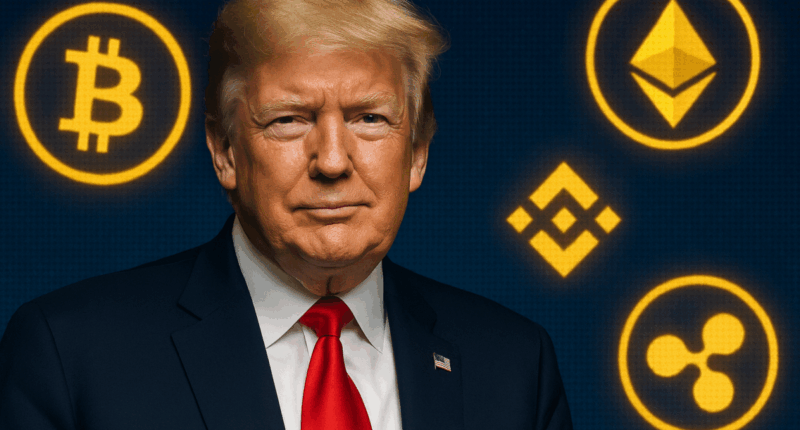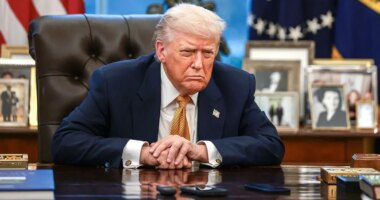Share this @internewscast.com
In a significant development affecting both financial markets and the political landscape, former President Donald Trump has embraced the contentious yet industry-backed GENIUS Act. This legislative proposal seeks to empower private companies to issue stablecoins within a regulatory structure aimed at fostering innovation while ensuring economic stability. Trump’s endorsement, announced via Truth Social and through active engagement with Republican lawmakers, elicited swift responses from both the crypto industry and financial markets.
A Sudden Surge in Market Confidence
Following Trump’s announcement of support for the GENIUS Act, Bitcoin saw an immediate jump to surpass $119,000, climbing nearly 5%, while Ethereum rose by 3.7%, breaking through the $3,000 barrier for the first time in several weeks. USDC stablecoin issuer Circle, a major proponent of the legislation, experienced a stock price surge of nearly 14% in after-hours trading. Additionally, companies like Coinbase and Robinhood also reported moderate upticks, reflecting a generalized market optimism.
Although some market analysts linked part of the movements to technical factors and recent institutional investments in ETH ETFs, Trump’s endorsement was largely viewed as the primary trigger.
“This is a policy turning point,” said Sheila Warren, CEO of the Crypto Council for Innovation. “The GENIUS Act now has the public backing of a major political figure, which dramatically shifts the odds for passage.”
What the GENIUS Act Actually Does
Short for “Giving Every Nation Immediate US-dollar Stability,” the GENIUS Act proposes a federal framework for privately issued stablecoins. Under the act, companies like Circle and Paxos could issue U.S. dollar-backed tokens if they meet capital, reserve, and disclosure requirements. The bill would preempt state-level bans and establish national licensing for qualified issuers.
Importantly, the act draws a line between stablecoins and central bank digital currencies (CBDCs), which it explicitly excludes from its provisions. This delineation appears to have been a critical factor in Trump’s decision to support the bill.
A Marriage of Interests: Trump and Crypto
Trump’s evolving stance on cryptocurrency has been a fascinating pivot. Once a vocal critic of Bitcoin and crypto—calling them “based on thin air” in 2019—his position appears to have warmed considerably. In recent months, he has hosted crypto-friendly fundraisers, met with blockchain entrepreneurs, and floated the idea of accepting crypto for campaign donations.
According to insiders familiar with Trump’s conversations on Capitol Hill, he views the GENIUS Act as a way to appeal to young, tech-savvy voters while also aligning with his broader anti-CBDC, pro-business platform. Trump has repeatedly warned that a Federal Reserve-issued digital dollar would represent a new form of government surveillance.
“The Federal Reserve should not be spying on Americans through their money,” Trump said during a closed-door session with GOP lawmakers, according to a leaked transcript. “Stablecoins let the free market compete. That’s what we want.”
Political Chess in Congress
While Trump’s support adds momentum, the bill still faces considerable hurdles. The GENIUS Act is one of three major crypto-related bills in play during what is being dubbed “Crypto Week” in Congress. The others include the CLARITY Act, which aims to define regulatory boundaries between the SEC and CFTC, and the Anti-CBDC Surveillance State Act, which seeks to ban the issuance of a U.S. central bank digital currency.
Earlier in the week, progress on the GENIUS Act appeared to stall when 13 Republicans unexpectedly joined Democrats in requesting more review time. Insiders suggest that Trump’s last-minute lobbying blitz—including one-on-one calls and pressure from pro-crypto PACs—was instrumental in reversing that trajectory.
Representative Tom Emmer (R-MN), a vocal supporter of crypto legislation, told reporters: “President Trump’s backing is a game-changer. I expect we’ll see movement on the floor by next week.”
Industry Reactions
Crypto Twitter lit up with speculation and celebration. Influencers praised the move as a sign of crypto finally achieving mainstream political support.
“When Trump goes crypto, you know it’s time to pay attention,” wrote @CryptoCassandra, a well-known analyst with over 400,000 followers.
Circle CEO Jeremy Allaire issued a statement within hours of the announcement:
“We welcome President Trump’s recognition of the important role stablecoins can play in preserving the global competitiveness of the U.S. dollar.”
Even some skeptics in the regulatory world acknowledged the significance of the moment.
Former SEC Chair Jay Clayton, speaking on Bloomberg TV, said: “This is going to spark real debate in Washington. Whether or not it passes, crypto is now part of the mainstream economic dialogue.”
Critics Sound the Alarm
Not everyone is celebrating. Senators Elizabeth Warren (D-MA) and Sherrod Brown (D-OH) released a joint statement condemning the GENIUS Act, calling it “a gift to shadow banks and fraudsters.” They argue that loosening controls on digital dollar equivalents could erode consumer protections and threaten financial stability.
“We’ve seen what happens when crypto is allowed to self-regulate,” said Warren. “We get fraud, we get scams, and people get hurt.”
Still, the momentum appears to favor passage. With Trump’s blessing, Republicans may see backing the GENIUS Act as politically expedient, especially with 2026 midterms already looming on the horizon.
What Happens Next?
Congress is expected to revisit the GENIUS Act vote later this week, with committee hearings fast-tracked following Trump’s endorsement. Analysts believe the most likely outcome is that the GENIUS Act is separated from the larger crypto bill package and brought to the House floor as a standalone measure.
If passed, the bill would make the U.S. the first major economy to provide a clear, national framework for stablecoins—something both the crypto industry and financial regulators have long been asking for.
A Tectonic Shift
In less than 24 hours, Trump’s calculated move has transformed a long-shot crypto bill into a top-tier legislative priority. Whether or not it passes in its current form, the GENIUS Act now symbolizes the convergence of political power and blockchain innovation.
For the first time, crypto isn’t just a financial tool or a tech trend—it’s a political wedge issue, a campaign strategy, and possibly a pillar of future U.S. economic policy. The market has noticed. Washington has noticed. And the rest of the world is watching.
Stay tuned—this is just the opening move.

















